Up to three scholarships valued at $7,500 each to support Canadian engineers returning to university for further study or research in a field other than other engineering.
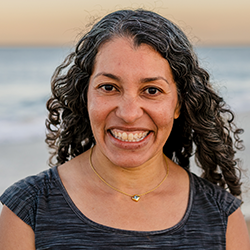
Each year, Engineers Canada assesses scholarship applications from students across the nation. These 13 undergraduate and graduate students demonstrate active and impactful involvement in the engineering community, exceptional academic achievement, and an exemplary commitment to advancing engineering. Through these scholarships, Engineers Canada provides these individuals the opportunity to explore, develop, and share their talents over the course of their studies and career. Meet the 2025 scholarship recipients.
Up to three scholarships valued at $7,500 each to support Canadian engineers returning to university for further study or research in a field other than other engineering.
Up to three scholarships valued at $12,500 each to support Canadian engineers returning to university for further study or research in an engineering field.
Up to eight scholarships of $4,000 each to support undergraduate engineering students who demonstrate exceptional leadership.
The Engineers Canada–TD Insurance Meloche Monnex Scholarship program offers three scholarships of $7,500 each annually to provide financial assistance to engineers returning to university for further study or research in a field other than engineering. Candidates must be accepted or registered full-time in a faculty other than engineering. The field of study chosen should favour the acquisition of knowledge pertinent to enhancing the performance of the candidate in the engineering profession.
Meet the recipients of the 2025 Engineers Canada–TD Meloche Monnex Scholarship

Nerissa Mulligan is pursuing a PhD in Education (Assessment & Evaluation) at Queen’s University to investigate how women’s and men’s experiences in engineering undergraduate programs differ. Her research includes examining gender disparities in self‑efficacy—a key factor linked to motivation and academic success of women in engineering—among first-year engineering students, how self-efficacy changes during the first year, and patterns in academic success and the impact of prior coursework. The goal of this work is to help programs recognize and respond to differences, refining curricula and instructional practices to support all students more effectively and, in turn, increase the attraction and retention of women and other students from historically underrepresented groups in engineering.
Mulligan’s involvement with the Chair for Women in Engineering has strengthened her commitment to translating research into action. By integrating technical expertise, lived experience, and data-driven analysis, she aims to bridge engineering and education to drive meaningful change.
Her motivation for pursuing this research stems from both personal experience and a deep desire to create systemic change in engineering education. Throughout her academic and work experiences she became acutely aware of the biases and barriers that women in engineering face. From dismissive comments as a graduate student to unequal treatment in the workplace, she has experienced firsthand how perceptions of competence are shaped by gender rather than ability. These experiences fuel Mulligan’s determination to investigate the factors that influence student pathways, persistence, and long-term success among engineering students.
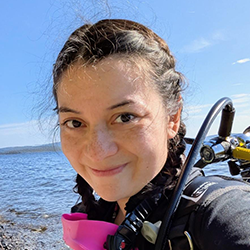
A Master’s student in Oceanography at Université du Québec à Rimouski, Véronica Romero Rosales is applying her engineering background to develop an AI-enabled robot that monitors and removes invasive zebra and quagga mussels. Since their introduction in late 1980s to the Great Lakes-St. Lawrence River basin, these invasive species have cost more than an estimated $1 billion in damage and control measures. So far, management has involved expensive specialized divers or chemical products with negative environmental side effects. The development of automated robots can provide rapid, ongoing management with minimal environmental and human risks.
Combining her experience as an engineer with graduate work in oceanography enables Romero Rosales to broaden her knowledge of geology, chemistry, biology, and marine physics and support to further innovation. Meanwhile, this interdisciplinary mindset strengthens collaboration between engineers, scientists and political decision-makers, which is vital in the search for solutions in the face of climate change.
The Engineers Canada–Manulife Scholarship program offers three scholarships of $12,500 each annually to provide financial assistance to engineers returning to university for further study or research in an engineering field. Candidates must be accepted or registered full time in a faculty of engineering.
Meet the recipients of the 2025 Engineers Canada–Manulife Scholarship
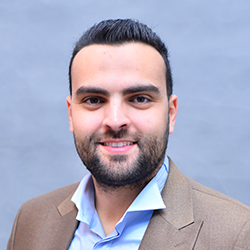
Majdi Flah is pursuing a PhD in Civil Engineering at McMaster University, where his research focuses on strengthening the durability of our infrastructure in harsh environments. From freeze-thaw cycles to exposure to road salts and sulphate-rich soils, Canadian structures face unique challenges. Current practices often lead to overdesign, high cement usage, and increased embodied carbon, factors that worsen climate change and shorten service life.
Flah’s research combines machine learning durability modelling with life cycle assessment to link concrete performance with environmental impact. By predicting how concrete responds to deterioration, his work identifies mixtures that maximize the use of recycled materials and industrial byproducts to replace cement, extend service life, and reduce carbon emissions.
As a practicing structural engineer, Flah recognised that in real-world environments, durability was frequently overlooked, resulting in rapid deterioration, high repair costs, and wasted resources. Meanwhile, he has seen innovation stifled as a byproduct of strict building standards, where tried-and-true methods are preferred despite their high carbon footprint.
Flah is determined to bridge this gap by bringing together computational modelling with material science and ultimately redefining durability standards in pursuit of safer, more resilient, and more sustainable infrastructure for future generations.
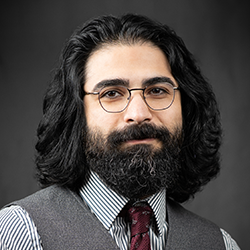
Mahdi Ghiasi is a Killam Doctoral Laureate at the University of British Columbia’s School of Biomedical Engineering. He has been internationally recognized for his contributions to artificial intelligence (AI) applications and has been included for five consecutive years in the Stanford/Elsevier list of the world’s top 2 per cent scientists. His doctoral research focuses on developing fair and equitable AI methods for the early detection of dementia. By integrating multimodal health data, including actigraphy, brain imaging, EEG, ECG, clinical assessments, and demographic and lifestyle factors, he designs diagnostic models that address sex and socioeconomic disparities.
Through affordable, non-invasive circadian rhythm monitoring combined with bias-sensitive AI, his work aims to identify early signs of dementia, a condition projected to rise by 65 percent by 2031 and cost the Canadian healthcare system more than $16 billion annually. Early diagnosis will enable timely interventions and improved patient outcomes.
Mahdi’s commitment to AI-driven research stems from a deep interest in applying technology to address complex health and engineering challenges. With a background in chemical, process, and energy engineering, he applies principles of mass transfer to biological systems and leverages process control and instrumentation for the development of biomedical devices. This interdisciplinary perspective underpins his research philosophy, which combines rigorous technical approaches with clinical collaboration and entrepreneurial pathways. His vision is to ensure that advances in AI not only drive innovation but also translate directly into equitable patient care, strengthening Canada’s role as a leader in health technology and responsible AI.
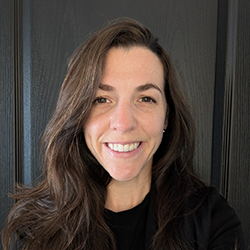
Emilie Pellerin, a PhD candidate in Civil Engineering at University of New Brunswick, is working to solve Canada’s housing supply challenges by improving modular construction methods, especially for large structures where misalignment and error accumulation can increase loads. Additionally, designing structural systems to withstand seismic and high wind forces is complex due to the segmented nature of modular construction.
An experienced structural engineer, her expertise in steel design, steel connections, and field repair solutions will be invaluable in her research on steel diaphragm discontinuity in modular buildings located in high-seismic zones. This research will focus on studying the effects of discontinuity on lateral load-resisting systems, while considering the field dimensioning challenges inherent in modular construction.
The socio-economic benefits of modular construction are significant. Faster construction timelines help address housing shortages, allowing new residents quicker access to quality homes. Cost efficiency in prefabrication also lowers labour and overall expenses, making housing more affordable. These reduced costs make housing more accessible and enables developers to build more homes more quickly.
The Engineers Canada Leadership Scholarship consists of eight scholarships of $4,000 each annually to provide financial assistance to undergraduate students in CEAB-accredited engineering programs. These scholarships are awarded to undergraduate engineering students who have completed one year of engineering studies and who demonstrate potential to be leaders in advancing engineering in Canada.
Meet the recipients of the 2025 Engineers Canada Leadership Scholarship
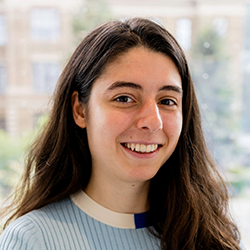
Lauren Altomare is an Engineering Science (Biomedical Systems) student at the University of Toronto, where she co-leads the University of Toronto Biomedical Engineering Design Team (UTBIOME), guiding the development of a laser-tipped endoscopic device to improve polyp removal. She mentors a multidisciplinary team, providing guidance to team members in both project design (computer-aided design, circuits, mechanical mechanisms) and laser testing on tissue surrogates, while leading the overall project direction.
As a future engineer, her vision centers on addressing the critical gap between laboratory innovation and clinical implementation in healthcare. Having observed diagnostic delays while volunteering at St. Michael's Hospital, she understands that even breakthrough technologies fail to impact patient outcomes when they remain confined to research settings.
As a student, Altomare has been actively involved across a number of initiatives, from head writer of the Faculty of Engineering’s long-running comedy sketch show, to a GEARS academic mentor, Schulich Leader Squad Captain, iGEM Advisor, and Co-President for the university’s chapter of Women in Science and Engineering (WiSE). Throughout her leadership in WISE, she launched a Canada-wide WiSE coalition and spearheaded the first-year rep program, empowering younger students to take on leadership roles and build a strong foundation for their future academic and professional endeavours.
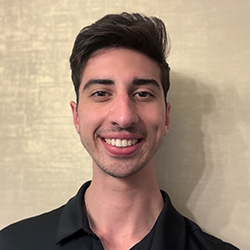
As a Computer Engineering student at the University of Toronto with minors in AI Engineering and Engineering Business, Dante Capobianco is committed to giving back to his community and contributing to the profession.
As a Deep Reinforcement Learning Researcher on U of T’s Autonomous Drone Racing team he helped spearhead the resolution of an overpitching/crashing behaviour issue that was holding back progress ahead of international competitions. He’s also been a mentor to first year students, where he has taught effective study methods, reviewed courses with mentees, derived formulas to support deeper understanding, and offered additional exam-review sessions. Beyond academics, Capobianco has been selected as the only Canadian to intern in Meta’s 2025 first- and second-year Software Engineering internship program, and has won Hack the North, Canada’s largest hackathon. Meanwhile, within the community, he’s volunteered at Habitat for Humanity, mentored a youth hockey team, and advanced social justice and mental health causes.
Capobianco’s vision is entrepreneurial. He has founded CapoDev, an app studio born of personal commitment to a growth mindset to think, feel, and act how he believes his future, accomplished self would. Through CapoDev, he seeks to create intention-centered tools that strengthen focus, productivity, and time management. The first app is currently in development and preparing for early-stage testing. It aims to disrupt the inefficient norms found in existing job platforms by clearing redundancies in application processes and empowering recruiters with clearer insights for smarter hiring decisions.
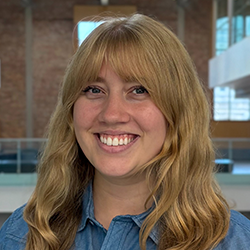
Kalena McCloskey is a Mathematics & Engineering student at Queen’s University. She is a former president of the Canadian Federation of Engineering Students, representing over 85,000 peers. She led the development of the 2024–2027 strategic plan, emphasizing equity, belonging, accessibility, bilingualism, and data-driven advocacy while also strengthening partnerships with organizations such as the Association of Consulting Engineering Companies - Canada, Engineering Deans Canada, and Engineers Canada.
McCloskey sees a future in engineering where she is creating innovative robotic solutions that centre around improving human and environmental well-being. A recent example of this is her summer research project focused on automating building inspection using various sensors and Simultaneous Localization and Mapping (SLAM) algorithms. Beyond her contributions, she aims to inspire younger generations to pursue careers in STEM fields and be an engineering leader who not only contributes technically to the profession but also empowers the next generation of engineers to do the same.
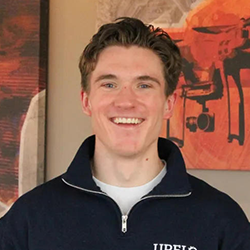
Ethan Nabuurs is pursuing a BSc. in Sustainable Design Engineering at the University of Prince Edward Island. As a future biomedical engineer, Nabuurs aims to develop neurological, cardiac, and prosthetic equipment to help people live more comfortable, vibrant, and fulfilling lives. He looks to help advance therapies such as pulse field ablation, deep brain stimulation, pacemakers, and prosthetic exoskeletons as technologies to help patients with Parkinson’s Disease, heart arrhythmias, and missing or partially functioning ligaments.
Nabuurs has been an active member of his community throughout his student life. As a teaching assistant he’s developed a passion for helping others while applying his own experiences as a first-year student where he was attempting to adapt to a fast-paced, mentally engaging, and exhaustive work environment. Currently, he’s vice-president of logistics for both the Engineering Leadership Summit (ELS), and the Summit on the Development of Engineering Societies (SDES). Working alongside students from across Canada, Nabuurs is responsible for helping create leadership-focused, technical, and motivating mentor-led sessions, schedule weekend events, create menus, organize delegate transportation, and book accommodations. His efforts are empowering engineering students from across Canada to develop leadership and life-long learning skills.
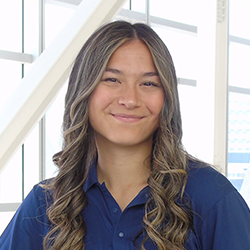
At the University of Calgary, Amber Quo studies Biomedical Engineering. She is also president of the Biomedical Engineering Students’ Society (BMESS) where she’s proud of the impact the group has had in raising funds through the Run4Cancer and supporting students by hosting career fair, internship panels, networking nights, and academic review sessions to sustain students' professional and academic growth. A highlight of the year has been co-hosting the Canadian Undergraduate Biomedical Engineering Conference (CUBEC), a national conference that brought together over 150 students and professionals in Calgary to network and develop professionally.
As an engineering student, she has competed in several engineering competitions, including placing third in the Western Engineering Competition (WEC) and advancing to the Canadian Engineering Competition. On the international stage, her team earned the Bronze Award at a biomolecular design competition in Japan, developing a point-of-care biosensor for Alzheimer’s diagnosis in hopes of improving the outcomes of those with the disease. She’s now sharing her experiences by mentoring this year’s team, hoping to help them achieve gold in the upcoming competition.
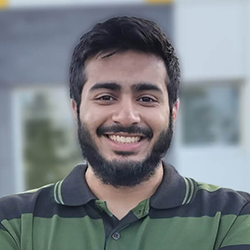
A Mechanical Engineering student at the University of Alberta, Muhammed Shareef is driven by a passion for accessible healthcare innovation. After volunteering at a local nursing home and witnessing firsthand the struggles elderly patients face to live independently, Muhammed designed an ergonomic utensil for individuals with motor disabilities to improve their comfort, dignity, and ability to eat without assistance. Through his engineering education, Muhammed aims to continue developing practical solutions that address real-world challenges and improve lives.
Apart from excelling in academics, Muhammed’s commitment to making a difference extends from designing real-world solutions to student mentorship and outreach. As an active member of student-led initiatives such as The Debtless Students (TDS), he supports high school students from underrepresented backgrounds by guiding them through college applications, crafting research proposals, and preparing strong resumes and cover letters for job opportunities. He is driven by a desire to help open doors for students to grow and succeed. Muhammed also leads student-led research initiatives and community workshops, creating spaces where innovation and mentorship intersect. Through these efforts, Muhammed strives to empower others and create lasting positive impact.
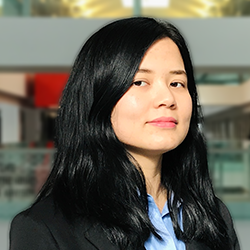
At the University of Toronto, Najma Sultani studies Engineering Science (Machine Intelligence Option), combining technical excellence with a commitment to social impact. She has won two engineering competitions at U of T for innovation design and consulting design among more than 400 participants. She also worked on an educational platform for children, where her team won the People’s Choice Award for their creative solution.
Sultani was recently selected as a Millennium Fellow, Class of 2025, recognizing the top 4 per cent of emerging global leaders for excellence, innovation, and social impact. As a mentor in the Faculty of Engineering, she helps first-year and high school students explore engineering through design projects and showcases, encouraging them to discover the field’s possibilities.
Growing up in Afghanistan, Sultani dreamed of becoming an engineer. Despite discrimination based on gender, language, religion, and tribe, she excelled academically and was preparing for university when the Taliban’s return to power ended her opportunities. She and her family fled to Canada, where she completed grade 12 while supporting her family and adapting to a new life. Her goal is to become an AI engineer and use artificial intelligence to create innovative, ethical, and accessible technologies that address real-world challenges. She hopes to inspire others to pursue engineering and technology, showing that courage and determination can overcome any obstacle.
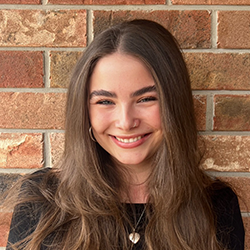
A Biomedical Engineering student at the University of Guelph, Sydney Yott has a passion for fostering community. She has served as a mentor in multiple capacities, including the Big Sisters Little Sisters program, orientation weeks, and the President’s Scholar Mentorship Program. This role in particular has been especially meaningful, watching as her mentees become club executives, earn scholarships, and succeed academically.
Within the engineering community, Yott is a class representative for the Engineering Society, advocating for students and supporting curriculum development. She helped organize a community of Indigenous engineering students to share their experiences and support one another. She is also an active member of the Women in Science and Engineering network (WiSE). This has been a defining experience, building an inspiring community for gender minorities in engineering.
She looks to pursue a career in biomaterials and materials engineering, developing innovative materials and coatings for assistive devices or implant technology. Sustainability is a core value, driving her to pursue biocompatible materials for medical applications that improve lives for patients and makes healthcare more sustainable along the way.